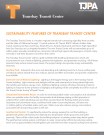Climate Change
The United Nations Intergovernmental Panel on Climate Change (IPCC) recently released an updated report emphasizing the need for immediate, aggressive measures to cut greenhouse gas emissions. The IPCC report identifies use of mass transit and development of dense, walkable urban neighborhoods as important steps toward reducing emissions.
In May 2014, the federal government’s Third National Climate Assessment reinforced the urgency of addressing climate change when it reported on climate change and its impacts in the United States. This report summarizes the impacts of climate change on the United States, now and in the future. A team of more than 300 experts guided by a 60-member Federal Advisory Committee produced the report, which was extensively reviewed by the public and experts, including federal agencies and a panel of the National Academy of Sciences.
Similarly, the Risky Business Project American Climate Prospectus documents the economic risks that climate change poses to specific sectors and regions of the U.S. economy. Climate conditions vary dramatically across the U.S., as does the mix of economic activity. Those variations will benefit our economic resilience to future climatic changes. But each region of the country has a different risk profile and a different ability to manage that risk.
The Transbay Project is a leader in reducing greenhouse gas emissions. It will add tens of thousands of riders to mass transit every day. The new Transit Center will connect 11 local, regional, and statewide transportation systems under a single roof and provide a new, downtown terminus for Caltrain and future high speed rail. By shifting passengers to mass transit, the Transbay Program will decrease reliance on regional highways, alleviate traffic, and reduce net emissions of greenhouse gases. It will also expand the regional labor pool, allowing both employers and workers to benefit from improved commuting conditions.
The Transbay Program will further reduce greenhouse gas emissions by developing a new pedestrian- and bike-friendly neighborhood surrounding the Transit Center. Residents and workers will enjoy proximity to jobs, shopping, and parks, in addition to public transit. The IPCC report recognizes all of these features as important steps toward reducing emissions from vehicular travel.
The Transbay Project is creating precisely the type of vibrant, welcoming, and transit-rich urban center that the IPCC endorses in its call to reduce global emissions of greenhouse gases.

